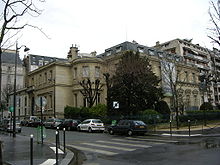Musée Marmottan Monet
 |
|
| Established | 1934 |
|---|---|
| Location | 2, rue Louis Boilly, Paris XVIe |
| Coordinates | 48°51′33″N 2°16′02″E / 48.8593°N 2.2673°E |
| Website | http://www.marmottan.fr |
Musée Marmottan Monet is located at 2, rue Louis Boilly in the 16th arrondissement of Paris. It features a collection of over three hundred Impressionist and Post-Impressionist works by Claude Monet (with the largest collection of his works in the world), Berthe Morisot, Edgar Degas, Édouard Manet, Alfred Sisley, Camille Pissarro, Paul Gauguin, Paul Signac and Pierre-Auguste Renoir. In addition it houses the Wildenstein Collection of illuminated manuscripts and the Jules and Paul Marmottan collection of Napoleonic era art and furniture as well as Italian and Flemish primitive paintings.
The nearest métro station is La Muette.
Originally a hunting lodge for the Duke of Valmy, the house at the edge of the Bois de Boulogne was purchased by Jules Marmottan in 1882 who later left it to his son Paul Marmottan. Marmottan moved into the lodge and, with an interest in the Napoleonic era, he expanded his father's collection of paintings, furniture and bronzes. Marmottan bequeathed his home and collection to the Académie des Beaux-Arts. The Académie opened up the house and collection as the Museum Marmottan in 1934.
Though originally a showcase for pieces from the First Empire, the nature of the museum's collection began to change with two major donations. In 1957, Victorine Donop de Monchy gave the museum an important collection of Impressionist works that had belonged to her father, Doctor Georges de Bellio, physician to Manet, Monet, Pissarro, Sisley and Renoir, and an early supporter of the Impressionist movement. In 1966, Claude Monet's second son, Michel Monet, left the museum his own collection of his father's work, thus creating the world's largest collection of Monet paintings. In 1985, Nelly Duhem, adopted daughter of the painter Henri Duhem, donated his large collection of Impressionist and Post-Impressionist works (which included several Monets) to the museum.
...
Wikipedia
